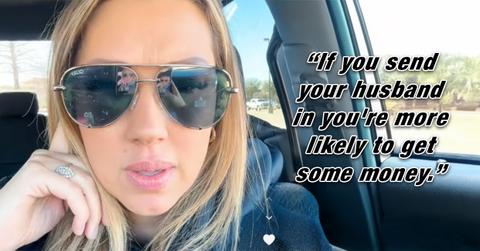
Wife suspected resale store of treating women differently. Her husband proves just how right she was.
By Greg SullivanOct. 25 2024, Updated 5:44 p.m. ET
Scarlett Johnson, known as @scarjo28 on TikTok, set out to test a theory that men might receive better resale offers than women. To her surprise, her husband got significantly better prices for their baby clothes than she did, even though they took in similar quality and quantity of items. Confused and frustrated, Johnson shared the incident on TikTok, sparking a conversation about gender bias in reselling.
Johnson, who had heard about this theory on TikTok, decided to see if it held true. In her video, she explains, "I saw on TikTok that if you send your husband in, you're more likely to get some money." The practice of reselling baby clothes is common as babies quickly outgrow their outfits, leaving parents with piles of barely-used clothes. Many turn to resale outlets like Once Upon a Child to sell these items and recoup some of their investment.
In an effort to get to the bottom of this, Johnson first took a batch of baby clothes to Once Upon a Child herself. She was quoted a certain amount which she thought was fair. However, when her husband went in with a similar batch, he was offered significantly more money for the same type and quality of clothes.
This disparity left Johnson puzzled. "It made no sense," she noted in her video. She couldn't understand why her husband received a better offer for the same items.
Johnson's TikTok video quickly gained traction, with many users commenting on their own experiences. Some women shared similar stories of feeling undervalued at resale shops, while others speculated about the possible reasons behind this discrepancy. A user, @mommyofthree, commented, "I've noticed the same thing! My husband always gets better offers. It's so frustrating."
"Even when I sold like 10 pairs of shoes last time and a bunch of clothes, I only got 90 bucks."
Others pointed out the broader implications of Johnson's findings. "This just goes to show how pervasive gender bias can be," wrote another user. "It's not just about big things like job offers or promotions, but even small transactions like reselling baby clothes."
Johnson's experience highlights a potential gender bias that might affect many women trying to sell their baby items. While her TikTok experiment may not provide a definitive answer, it does raise important questions about fairness and equality in everyday transactions.
If you've experienced similar discrepancies, consider sharing your story and bringing awareness to this issue. Change often begins with small steps, and by speaking out, we can work towards more equitable treatment for everyone.
This article was originally published on July 26, 2024. It has since been updated.
